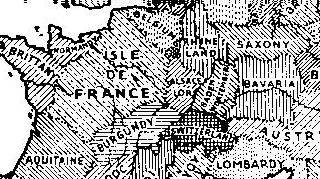22 – Europe: core and peripheries
Post #12 shows a map identifying three core areas of Europe with transition zones in between. This map here has a different approach to European cultural diversity.
On the one hand, it posits a contiguous cultural core – roughly correspondent, coincidentally with Charlemagne’s empire (plus a swathe of England and Scandinavia) – and with the original European Community (the three Benelux countries, West Germany, France and Italy).
On the other hand, it describes some parts of Europe as less ‘European’ than this core by quoting several writers, artists and thinkers (from the ‘core’, obviously):
Ireland: “That savage nation” (Edmund Spenser)
Brittany: “Wild and primitive” (Paul Gauguin); “Frankly pagan” (J. Cameron)
Spain: “Africa begins at the Pyrennees” (Alexandre Dumas); “Outside the southern door of Europe proper” (James Michener)
Corsica: “Still savages” (Alexandre Dumas)
Sardinia: “Rejected European civilisation” (P. Nichols)
Sicily: “Stagnant and backward” (L. Barzini)
Mezzogiorno (southern Italy): (L. Barzini)
Albania: “Savage character” (Lord Byron)
Bulgaria: “A mongrel east” (A. Symons)
Greece: “All the Turkish vices” (Lord Byron)
Istanbul: “Damn her, the whore! Sleeping with the Turks” (A. Kazantzakis)
Cyprus: “East in west and west in east” (P. Geddes)
Ukraine: “A decided Oriental kink in their brains” (British Foreign Office)
Poland: “Advanced outpost of Western civilisation” (Joseph Conrad)
Russia: “Scratch a Russian and you will wound a Tartar” (Napoleon)
Finland: “Fierce and uncivilised” (M. Pitts)
Sadly, as I’ve downloaded this map a long time ago and (again) didn’t make a note of the origin, I can’t say much about the context. However, the use of highlighter seems to indicate that it was made in a school environment…
The ‘present core’ of Europe (“Where defining traits are strongest”) is highlighted in red. Green is used to highlight some boundaries of these traits – and it all seems to boil down to the limits of Christianity versus Islam and paganism (Arab rule in Spain, Turkish rule in the Balkans, Christianity in the north about 1030, Christianity in the south at present) – making the point that ‘European’ actually is synonymous with ‘Christian’. Which is a controversial point – recall the debate about the EU Constitution not mentioning Christianity as a ‘core European trait’.






